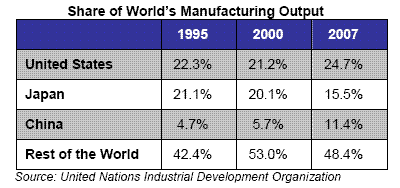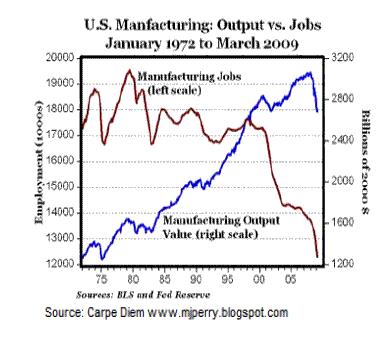 It makes the world’s savers reluctant to be exposed to the U.S. dollar.
It makes the world’s savers reluctant to be exposed to the U.S. dollar.Posted on 10/05/2009 4:25:24 AM PDT by expat_panama
The United States has been hollowed out. It no longer manufactures goods. Once the factory of the world, the U.S. now manufactures debt. The high wage manufacturing jobs have been out-sourced to low wage economies. The demise of U.S. manufacturing is at the core of the decline of America, its chronic trade deficits and growing international indebtedness. It makes the world’s savers reluctant to be exposed to the U.S. dollar.
It makes the world’s savers reluctant to be exposed to the U.S. dollar.
There is one problem with this widely held view: It is factually wrong.
The value of U.S. manufacturing output in real terms (adjusted for inflation) was a little more than $3 trillion in 2008. That is up from $1.2 trillion in 1972. If the U.S. manufacturing sector was a separate country, it would be the world’s 5th largest economy (behind the rest of the U.S., Japan, China and Germany). The U.S. remains the world’s largest manufacturer. Full stop.
 Although international comparisons are fraught with measuring problems, it appears that the U.S. share of world manufacturing is roughly the same as the combined total of the BRICs (Brazil, India and Russia account for a combined 11-12% share).
Although international comparisons are fraught with measuring problems, it appears that the U.S. share of world manufacturing is roughly the same as the combined total of the BRICs (Brazil, India and Russia account for a combined 11-12% share).
The data also suggests that the impressive rise of Chinese manufacturing has come at the expense of Japan and other East Asian countries more than the United States, which the UN data suggests actually saw a small rise of its global share in recent years.
China has largely injected itself into the production chain at the labor intensive stages, so that television or electronic good that may have been made in Japan or Taiwan or South Korea now says made in China.
[snip]
(Excerpt) Read more at realclearmarkets.com ...
We rebuilt our enemies’ manufacturing capability with modern equipment, while neglecting the infrastructure we had all-but used up during WW2. EEverything we had was wearing from maximum usage, and those guys got shiny new steel. I believe it was a shot in the foot...
Marshall Plan
From Wikipedia, the free encyclopedia
U.S. Secretary of State George Marshall
The Marshall Plan (from its enactment, officially the European Recovery Program, ERP) was the primary plan of the United States for rebuilding and creating a stronger foundation for the countries of Western Europe, and repelling communism after World War II. The initiative was named for Secretary of State George Marshall and was largely the creation of State Department officials, especially William L. Clayton, George F. Kennan, and Robert Rosemont. George Marshall spoke of the administration’s desire to help European recovery in his address at Harvard University in June 1947.[1]
The reconstruction plan, developed at a meeting of the participating European states, was established on June 5, 1947. It offered the same aid to the USSR and its allies, but they did not accept it.[2][3] The plan was in operation for four years beginning in April 1948. During that period some USD 13 billion in economic and technical assistance were given to help the recovery of the European countries that had joined in the Organization for European Economic Co-operation.[4]
By the time the plan had come to completion, the economy of every participant state, with the exception of Germany, had grown well past pre-war levels. Over the next two decades, many regions of Western Europe would enjoy unprecedented growth and prosperity. The Marshall Plan has also long been seen as one of the first elements of European integration, as it erased tariff trade barriers and set up institutions to coordinate the economy on a continental level.
-http://en.wikipedia.org/wiki/Marshall_Plan
I'm afraid that you are about 100 years too late.
We have had 40 years of trying to move the Nation towards a FIRE economy, with an accompanying subsidy of the vices of the underclass. You might as well write the inauguration speech of the second Obama term; you know, the one that lasts twenty years?
People need productive things to do. It is our nature. Trading stocks is not productive labor. Practicing law as it is done today is not productive labor.
Remember that John Galt built things.
Thanks for posting this article. Very interesting.
They can resell the real goods at several levels, speculate on and manipulate the raw materials supply, create regulations and taxes, Initiate class actions against the producers of real goods, and create IPOs based on other peoples' technologies.
Just as ever.
There's plenty of work, as long as it does not involve (eek) dirty hands.
Precisely! It's not "real" manufacturing unless I say it is! Has anyone ever removed those categories and calculated the number? If not, why not? Because it would still show a gain, maybe?
LOL!
How we got to be where we’re at, huh?
Are you asking or following a point? The answer is pretty easy to get out because we as a nation tend to keep track of people and money.
my pleasure —cheers!
The Clinton Administration had the power to stop the Magnequench sale, and it didn’t, much like the Clinton EPA had the power to keep that rare-earths mine open in California, but didn’t.
All these percentages are basically meaningless. There have been such drastic changes in the denominators (Total World Manufacturing and US GDP) used to generate these percentages that the resulting percentages mean little.
For percentage comparisons to be meaningful, the denominator must have remained fairly consistent as to the ratios of the various elements which make up the denominator. The elements of these denominators has changed drastically over 60 or more years. Ex. the US had its first $100 billion budget under Kennedy. It’s now $3 trillion plus.
It would take a lot more analysis than a simple division of one element of GDP by total GDP to yield meaningful percentages because the denominators have changed so much.
What are we talking about here --do we want people in factories because you're saying it's 'natural' or do we want to actually manufacture things? We don't need more people in the factories no matter how happy factory smoke is supposed to make them. They just get in the way. Maybe you could set up some kind of factory theme park where they could go and get it worked out off to one side.
Trading stocks is not productive labor.
You know very well that virtually all US factory ownership is incorporated. No stock traders no factories.
Unions demanding to get what they deserve, usually get what they deserve.
Are there any numbers you like?
lol
hmm, that would make a great tagline...
Why? Food processing is manufacturing.
One of the definitions of capitalism is the separation of the goods-making process into more and more increasingly complex steps. It's through that increasing complexity that capital is ultimately employed to produce more goods at less cost.
The food processing industry is a perfect example of that. Where food once went directly from the farmer to the consumer, it now undergoes several phases of refinement which increase its safety, shelf-life and distribution area.
This process can only be maintained -- as many above have pointed out -- by struggling against government policies that choke off the creation and free-flow of capital.
This article is correct that our manufacturing base hasn't declined as many seem to believe, but it could represent a significantly higher percentage of GDP if we hadn't diverted so much of our capital into non-productive ventures [read government] over the past several decades.
The transition to a service-oriented economy is not inevitable.
It's not a matter of what anyone likes, but whether or not it's valid to generate stats from denominators whose makeup has changed significantly over the time period used. Ask a statistician or mathematician about stats from inconsistent denominators.
Are there an applicable numbers that you can provide as being "valid to generate stats from denominators whose makeup has changed significantly over the time period used" or have you rejected all statistician and mathematician stats?
I’m not the one who introduced this topic and drew conclusions from very scant data. And why did you start the US % of world manufacturing in 1995?
An interesting stat would be dollar value of mfg. goods sold in the US compared to dollar value of mfg. goods produced in the US over several decades.
A big factor in these comparisons is that there are so many more products being produced now that didn’t even exist twenty and more years ago. How much has total mfg. grown worldwide and in the US over the decades? Mfg. as percentage of GDP doesn’t tell us very much.
Disclaimer: Opinions posted on Free Republic are those of the individual posters and do not necessarily represent the opinion of Free Republic or its management. All materials posted herein are protected by copyright law and the exemption for fair use of copyrighted works.